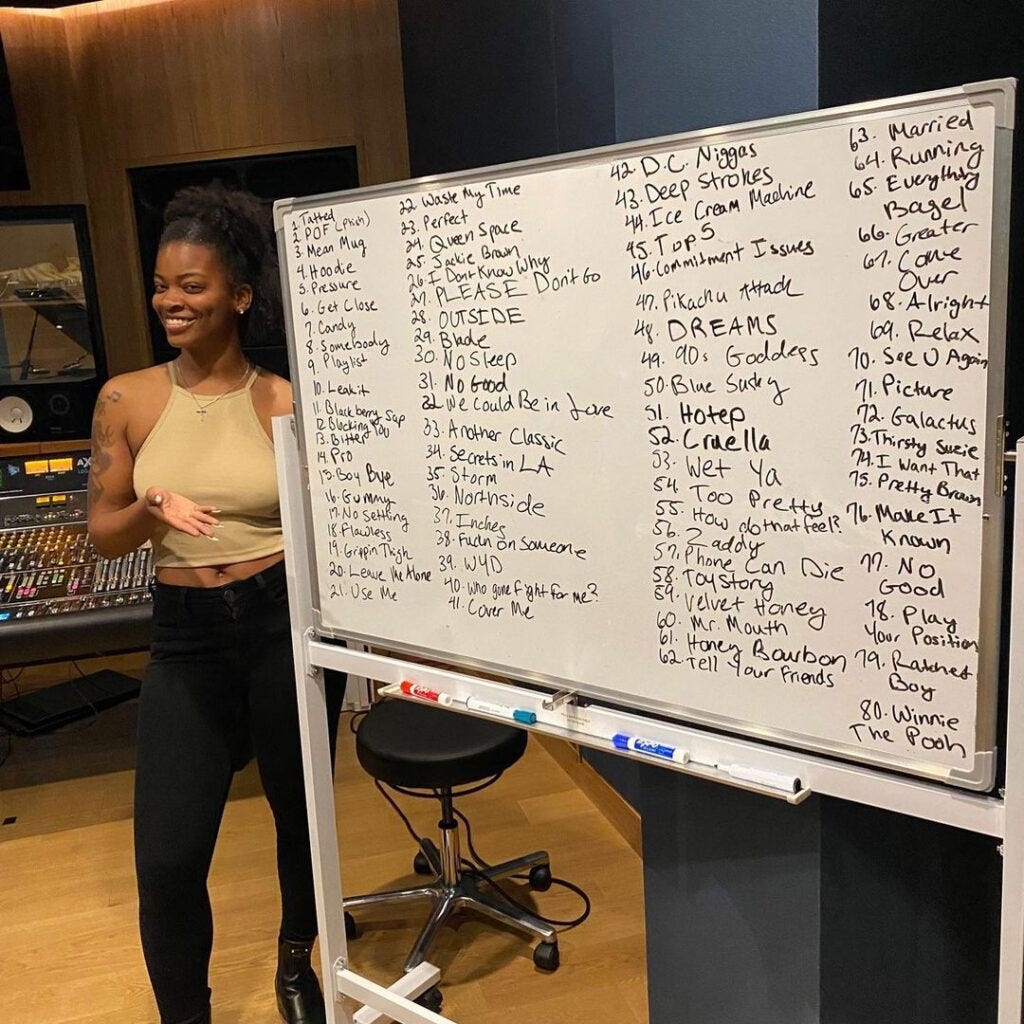Ari Lennox: Age/Sex/Location
The most pleasurable of 2022’s numerous attempts to marry old school soul values to contemporary interpersonal concerns within an album-long narrative arc, this one inspired by Eat, Pray, Love; somebody can draw me a diagram. Since Shea Butter Baby, Lennox’s singing has become more artful: her little vibratos and melismas escape the whisper/belt dichotomy of much contemporary R&B, plus she lets you understand the words without overenunciating like a damned folkie. And the words are good! “The audacity to lecture me about your Christianity/Then turn around and try to fuck on me” on the opener sets up one line of inquiry, “no dick makin’ me stupid” another (one that I don’t think was expressed in those words in Eat, Pray, Love, though correct me if I’m wrong.) When loverman/dickhaver Lucky Daye shows up and lapses into sprechgesang, she says she doesn’t date rappers, so maybe she did get smarter. Her immediate needs satisfied, she invites over Chlöe Bailey to somehow manage to make a double entendre called “Leak It” classy. Perhaps the eventual return to mainstream R&B isn’t the most inspirational ending, but at least it’ll be hard to cast Julia Roberts in the movie adaptation.
Grade: A (“Pressure”, “Boy Bye”, “Waste My Time”)
Tyshawn Sorey Trio +1 with Greg Osby: The Off-Off Broadway Guide to Synergism (Spotify version)
Because it’s my job, I’ve played the full version—three live sets pushing four hours led by drummer and perennial Francis Davis Jazz Poll contender Sorey, “standards” if you’re the sort of person who can hum along to Song X deep cuts—and verified it’s dud-free, so if you want to support America’s Classical Music Except Broke, you’re encouraged to shell out the $30-35. Four above-average tracks suffice to give you the gist, however, and makes for at least as enjoyable a listening experience—the sampler isn’t mixed, so the transitions are jarring, though one suspects most would listen to the big set on shuffle anyway. An 11-minute “Chelsea Bridge” is just pretty, with Greg Osby furnishing long lyrical passages on alto and pianist Aaron Diehl engaging more concretely with the melody than is often the case on modernist remakes. Ornette’s “Mob Job” lets the group get freer, with Osby aggressive and Diehl tapping away like he’s touch-typing. Osby digs out his mentor Andrew Hill’s “Ashes” to show off a more angular beauty, while Sorey and bassist Russell Hall get to display their immaculate sense of rhythm, perhaps for a minute too long. Last up, McCoy Tyner’s “Contemplation” makes efficient use of the whole group, with Hall’s glissandos a fitting complement to Diehl’s stateliness and Sorey showing his knack for finding the right microsound for the moment.
Grade: A MINUS (“Chelsea Bridge”, “Mob Job”)
Balka Sound
’80s Congo-Brazzaville music that’s in a somewhat uncanny valley for listeners more familiar with Congo-Kinshasa. I can hear its structural relationship with the polished soukous of the time: often there’s a main vocal section, then a contrasting breakdown analogous to a sebene. Yet the rhythmic basis is different—“Beembe”, says Strut Records. Wherever the patterns are from, they’re captivating. Sometimes the singing of bandleader Nkibi Albert and his rotating cast adds to the charm and sometimes it doesn’t do much, but you have to admit they have a knack for (translated) titles: “I Refuse to Marry”, “Wasting Old Age”, “Posthumous Advice”. My only kvetch is that while the running order, which foregrounds the glossy stuff, is appropriate for a first taste, it disguises that the pan-Congolese style was something they consciously moved towards. So after a couple of plays, put it in chronological order and respect their evolution.
Grade: A MINUS (“Ni Kuel’ko (I Refuse to Marry)”, “Lekou (Death)”, “Ka Mu Wila Ko”)
Prince Kaybee: Gemini
Highly listenable and a bit too long like so many South African electronic dance collections, this time highly listenable wins out. Kaybee doesn’t attempt much fusion, staying in a moody-chorded deep house lane without engaging with gqom’s and amapiano’s modernizations; even on the closing “Jazz According to House” there’s no question which genre is in charge. One reason Gemini nevertheless stands out is that there isn’t a weak link across something like eighteen varied guest singers, among whom only one Zaba appears twice. More than that, Kaybee makes the absolute most of the elements he has: when he finds a stick drum sound he likes, he’ll find a way to shape it and deliver it to you over and over without it sounding harsh or repetitive. And he manufactures enough drama to sustain interest for the vast majority of the 76 minutes, peaking on sole instrumental “Milani”—the name shared by his infant son and his wine label—on which a violin speaks for people and pinots who can’t.
Grade: A MINUS (“Milani”, “Breakfast in Soweto”, “Sbindi Uyabulala”)
Lyrics Born: Vision Board
In order for a rapper to have any non-sociopathic fun these days, getting older seems to be a necessary-not-sufficient condition—some choosy choosy life choices are required for one to retain insouciance. That LB’s a funk-rap guy rather than an alt-rap guy or a regionalist helps, maybe not least with those life choices. Given his discography, on “I’m the Best Rapper in the World”, he doesn’t feel it necessary to put forward new evidence for the title (though I respect him getting “tight” into a sequence of “oi” rhymes), instead using the claim itself as a taunt over pizzicato and drums. More often, he comes across as the Most Sensible Rapper in the World. He talks about dumb shit family members have done with sympathy, while recognizing certain people need to be kept away from certain other people for everyone’s sanity. Only climbing Everest in alligator boots seems ill-advised, but it’s okay to be figurative sometimes.
Grade: A MINUS (“Choosy Choosy”, “I’m the Best Rapper in the World”, “Alligator Boots”)
Paal Nilssen-Love Circus: Pairs of Three
“Nazare da Mata” is a hella fun opener, with a Pernambuco party fanfare interrupted by avant-accordion and swallowed boings and even some jazz. Brazilian motifs appear from time to time after that, but South African-born singer Juliana Venter (whom the Bandcamp bio compares to Elza Soares, which isn’t as ridiculous as it sounds) aside, this sounds like your typical good Nordijazz record. Any departure of your opinion from this mean will depend on whether you find Venter, who calls Americans “marks, suckers, stooges” (now that's not nice) good-annoying or annoying-annoying. I have her in the former camp more often than not: even her playground-taunts nyeh-nyehs have some ambiguity, not to mention her orgasms. Otherwise, Nilssen-Love’s usual crew of gender-balanced Trondheim and Oslo grads plays well, notably alto Signe Emmeluth and guitarist Oddrun Lilja, from whose shredding on “Breakfast in Columbia” Venter emerges like Athena, or maybe Carmen Miranda.
Grade: B PLUS (“Nazare da Mata”, “Breakfast in Columbia”, “Round About Lapa”)
Ibibio Sound Machine: Electricity
Having roped in a veteran British indie pop band to produce, the sound machine sounds like it’s eaten Hot Chip and is lying around, rousing itself from time to time to supply occasional Afrobeat characteristics, though on the water-drumming inspired closer, no one so much as brings a bucket. Yet this lets their primary strength—Eno Williams, a genuine Good Singer of a caliber rare in fusion outfits—dominate the album. She chants the title of “Protection from Evil” like a skilled Dota 2 support player spamming buffs, while on “All That You Want” she varies her volume to gracefully counterpoint an agile synth. She carries the uh-oh atmospheric ones through vocal interest alone. It’s surprising that she hasn’t attempted a solo record, but as long as she has the run of the machine, it’s perhaps unnecessary.
Grade: B PLUS (“Protection from Evil”, “Wanna See Your Face Again”, “All That You Want”)
Tyson Sybateli: Home
The South African Internet’s great rap hope has a comfortable if evidently Americanized flow more than a little like Denzel Curry’s, without the latter’s current introspection. He doesn’t quite have the originality or the narrative chops to justify the prevailing mid-tempo, but he’s an adept rhymer capable of generating momentum even when the beat offers little propulsion, as on the drumless “If Found, Bring Home”. “Home & Away Games” is the standout, starting out with a plinking motif that for once sounds different from what a Floridian would put up with, followed by a beat change to a treated piano accompaniment that lets him and great SA street-rap hope Thato Saul one-up each other with ace lines. Sybateli trumps with “Snitches get stitches, at least they getting something.”
Grade: B PLUS (“Home & Away Games”, “If Found, Bring Home”, “Handout”)
PinkPantheress: Take Me Home EP
The lead track wasn’t my fave—boys lie, we know that, she knows that and isn’t going to get too worked up about it—until the remix with a Louise-to-her-Thelma guest verse from Ice Spice (who gets worked up about it); it should be confirmed as their global breakout hit within days. Our Pantheress gets a little more agitated on “Do You Miss Me?”, which is about how boys lie, before wondering “does she miss you too?” like the high-empathy intellectual she is and wondering if she’s the other woman for a verse. The title track, about failing to adult, is the most tuneful and wryest, with her basement-level standards for men leading to a Courtney Barnett-like sitcom interaction with her doctor. Growing up is necessary; that doesn’t mean one can’t postpone it eight minutes at a time.
Grade: B PLUS (“Take Me Home”, “Do You Miss Me?”)



